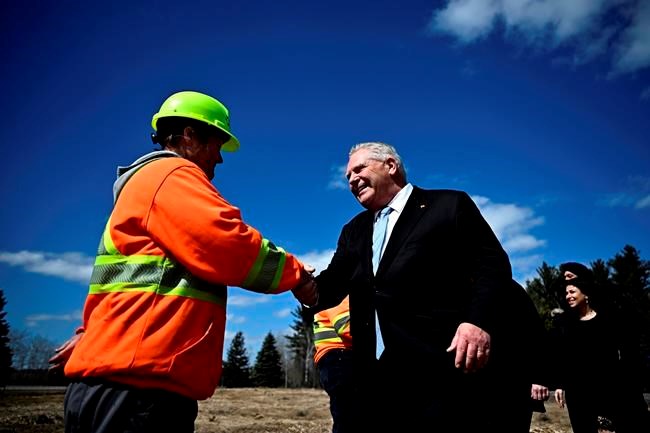TORONTO — The Ontario budget's failure to directly address climate change represents a "gross abdication of responsibility" by the government, some critics argue, saying the province rapidly needs to do more to adapt to a changing climate.
The budget presented Tuesday cites investments in climate-friendly public transit, electric vehicle manufacturing and conservation, but critics say it's mostly silent on how the government will specifically help communities mitigate the effects of climate change and adapt to the realities of it.
"This is a gross, abdication of responsibility because the climate crisis continues to worsen," said Keith Brooks, a programs director with Environmental Defence, an environmental advocacy organization.
"Many of the tools that need to be used to fix the climate crisis are in the provincial toolbox."
The 200-page budget makes only two references to climate change, both in sections about the sustainable bond program, which the government uses to raise money to finance projects considered environmentally friendly.
The federal carbon price, on the other hand, came up 10 times in the finance minister's budget speech as he criticized Ottawa's measure.
As last summer's extreme heat and wildfires gave way to the warmest winter on record, threatening tourism sectors and melting winter roads to remote First Nations, critics say the government needs to show it's better prepared.
"This is not a government that is serious about dealing with one of the great issues of our time," said Gideon Forman, an Ontario climate change and transportation policy analyst at the David Suzuki Foundation.
In a statement, the environment minister's press secretary mentioned a number of the budget's initiatives, including green bonds to finance "extreme-weather resistant infrastructure" and clean steel production.
"We've proven that you can protect the environment without a costly, job-killing carbon tax," said Alex Catherwood, press secretary to Minister Andrea Khanjin.
Governments in Quebec and British Columbia, meanwhile, made climate change a feature of their recent budgets. Quebec's budget included a section on environment and climate change adaptation, paired with a $127.5-million investment over five years. The B.C. budget pledged $1 billion to climate-related initiatives, including bolstered wildfire response.
The Ontario budget set base funding for forest firefighting at $134.9 million this year, $81 million less than it spent overall in 2023.
But Catherwood said it would be "completely inaccurate" to suggest the forecasted spending was a budget cut, saying the government would "spare no expense in ensuring the safety of people, property, and communities."
Catherwood said base funding for emergency fire preparedness had nearly doubled to $135.9 million since 2018, with additional support for firefighter retention and recruitment.
It comes as experts say climate change is intensifying wildfires and warn 2024 could rival last year's season.
Green Party Leader Mike Schreiner says the budgeted money, however, shows "that we have a Ford government that's woefully unprepared for the climate crisis."
"If you talk to wildland firefighters, they will tell you that the money is much better spent if we properly prepare ahead of time rather than reacting after, in last year's case, a million acres are on fire," Schreiner told reporters this week.
The government's fiscal watchdog, and its own climate assessment report, have warned that climate change threatens to upend everything from infrastructure to food security.
Ontario's Financial Accountability Office reported in November that the dangers of a changing climate could add more than $4 billion per year to the cost of maintaining Ontario's public infrastructure. The report said the province and municipalities could cut that cost by proactively making hospitals, schools, stormwater pipes and other public infrastructure more resilient to extreme heat and rainfall.
Businesses too have pressed for better climate preparation from the government. The Ontario Chamber of Commerce, in response to the budget, urged the province to take "bold action" in the second half of its mandate to support climate resilience through a climate adaptation and mitigation plan.
Brooks, from Environmental Defence, said the budget appears to indicate the government is tuning out "all of the evidence that tells us we need to be investing more in mitigating emissions and adapting to climate change that's already locked in."
The government did score praise from some environmental groups for certain initiatives.
The budget's $20-million investment over four years in the Greenlands Conservation Partnership was welcomed by Nature Conservancy Canada and the Ontario Land Trust Alliance, two non-profit partners in the program.
The fund is used to purchase private lands and turn them into local and regional land trusts, protecting 167,000 hectares of land since the program's launch in 2020.
"Conserving natural spaces plays an important role in mitigating and adapting to the effects of climate change by providing safe havens for wildfire, capturing and storing carbon, and improving resilience to weather events, such as flooding and drought," Dana Kleniewski, Nature Conservancy Canada's acting regional vice-president in Ontario, wrote in a statement.
This report by The Canadian Press was first published March 29, 2024.
Jordan Omstead, The Canadian Press


